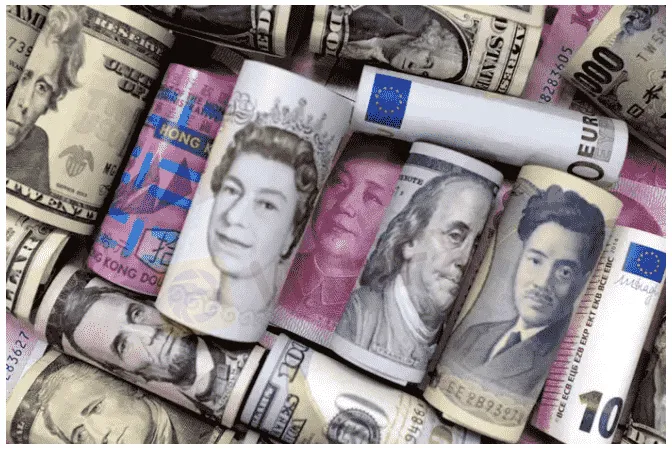简体中文
繁體中文
English
Pусский
日本語
ภาษาไทย
Tiếng Việt
Bahasa Indonesia
Español
हिन्दी
Filippiiniläinen
Français
Deutsch
Português
Türkçe
한국어
العربية
Friendless yen faces third straight week of decline
Abstract:The yen was headed for its worst week in two years on Friday, pummelled by Japans rising import costs and low interest rates, while commodity currencies were set for a second consecutive weekly gain on the dollar as export prices remain elevated.

The euro has been slightly softer this week and was pinned at $1.1005 by concern that conflict in Ukraine will hurt Europes economy by raising energy and food costs.
Australia is an exporter of both and rising prices have helped the local dollar to a second weekly rise of more than 1% in a row. The Aussie was last steady at $0.7508, just below an overnight four-month high of $0.7527.
The yen, by contrast, is breaking down and has shed 2.6% against the greenback for the week. It has fallen past the psychological 120-per-dollar barrier and, at 122.44, is eyeing a test of major resistance around 123.70.
It has lost nearly 6% through March and been smoked even harder on crosses, losing some 8% against a resurgent Aussie in just eight sessions.
The latest leg of the tumble was triggered by hawkish remarks from Federal Reserve Chair Jerome Powell this week, and a subsequent rip higher in U.S. yields.
The Bank of Japan (BOJ) has also stuck, by contrast, to a dovish tone, though some traders are starting to think that, at a six-year low, the yen is plumbing some uncomfortable depths.
“One thing to watch for in dollar/yen is pushback from policymakers in Japan,” said Brent Donnelly, trader and president at analytics firm Spectra Markets.
“I‘m not sure we’re quite there yet, but the 123.50/125.00 level is almost certain to attract some attention and generate headlines from either PM (Fumio) Kishida or FinMin (Shunichi)Suzuki,” he said.
“Pushback could also come from BoJ (Governor Haruhiko) Kuroda.”
The bond market is also putting policymakers between a rock and a hard place by bringing on a challenge to yield curve control, which if defended could further weaken the yen.
The yield on 10-year Japanese government bonds hit 0.235% on Friday, close to its upper limit of 0.25%.
Inflation is yet another pressure point, and core consumer prices in Tokyo have logged their fastest annual increase in more than two years this month, data showed on Friday.
Elsewhere gains in commodity prices have supported the New Zealand dollar, though it has run into stiff resistance just short of $0.70 and was last at $0.6964. [NZD/]
Sterling hovered at $1.3190 as traders weigh a cautiously dovish outlook from the Bank of England against February data that showed higher-than-expected inflation. [GBP/]
Russia‘s rouble traded firmly in Moscow overnight following Russian President Vladimir Putin’s vow to start selling gas to “unfriendly” countries in roubles, but it handed back some gains in thin offshore trade.
It was last at 102.00 per dollar.
========================================================
Currency bid prices at 0034 GMT
Description RIC Last U.S. Close Pct Change YTD Pct High Bid Low Bid
Previous Change
Session
Euro/Dollar
$1.1009 $1.0998 +0.10% -3.16% +1.1011 +1.0995
Dollar/Yen
122.1400 122.3150 +0.09% +0.00% +122.4300 +122.3500
Euro/Yen
134.46 134.56 -0.07% +3.18% +134.7400 +134.2700
Dollar/Swiss
0.9281 0.9301 -0.19% +1.77% +0.9302 +0.9279
Sterling/Dollar
1.3193 1.3188 +0.02% -2.47% +1.3198 +1.3189
Dollar/Canadian
1.2536 1.2526 +0.09% -0.84% +1.2538 +1.2518
Aussie/Dollar
0.7510 0.7514 -0.04% +3.32% +0.7518 +0.7504
NZ
Dollar/Dollar 0.6964 0.6965 +0.01% +1.76% +0.6966 +0.6958
All spots
Tokyo spots
Europe spots
Volatilities
Tokyo Forex market info from BOJ

Disclaimer:
The views in this article only represent the author's personal views, and do not constitute investment advice on this platform. This platform does not guarantee the accuracy, completeness and timeliness of the information in the article, and will not be liable for any loss caused by the use of or reliance on the information in the article.
Read more

Webull and Others Fined $275,000 for Incomplete Suspicious Activity Reports
Webull Financial, alongside Lightspeed Financial Services Group and Paulson Investment Company, LLC, has agreed to pay a collective fine of $275,000 following an investigation by the US Securities and Exchange Commission (SEC). The penalty was issued due to the firms’ failure to include essential information in suspicious activity reports (SARs) over a four-year period.

Barclays Resolves £40M Fine Over 2008 Fundraising Disclosure Failures
Barclays has reached a settlement with the UK’s Financial Conduct Authority (FCA), agreeing to pay a £40 million fine for failing to adequately disclose arrangements with Qatari investors during its critical fundraising efforts amidst the 2008 financial crisis.

WikiEXPO Global Expert Interview: Advanced Practices and Insights in Financial Regulation
In the midst of rapid advancements and evolving landscapes in financial technology, financial regulation, and ensuring financial security, WikiGlobal stands at the forefront, closely tracking these transformative trends. As we embark on our series of exclusive interviews focusing on these pivotal areas, we are delighted to have had an in-depth conversation with.

Alleged Concerns with TradeEU.global's Trading Practices
An individual trader has come forward with allegations of an unfavourable experience while using the services of the broker TradeEU.global.
WikiFX Broker
Latest News
Saxo & Portuguese Bank Partnership
SEC Fines Broker-Dealers $275K for Incomplete SAR Filings
Elon Musk Warns of Imminent US Bankruptcy | Bitcoin Retreats from $100K
UK FCA Fines Barclays £40 Million Over 2008 Deal
WikiEXPO Global Expert Interview: Advanced Practices and Insights in Financial Regulation
Justin Sun Invests $30M in Trump-Backed World Liberty Financial
Lured by False Promises: Malaysian Driver Lost RM218K to an Investment Scam
FTX Sets March 2025 Timeline for Creditor Payouts: What It Means for Investors
What is an Economic Calendar? How it works
Pros & Cons of Automated Forex Trading
Currency Calculator



